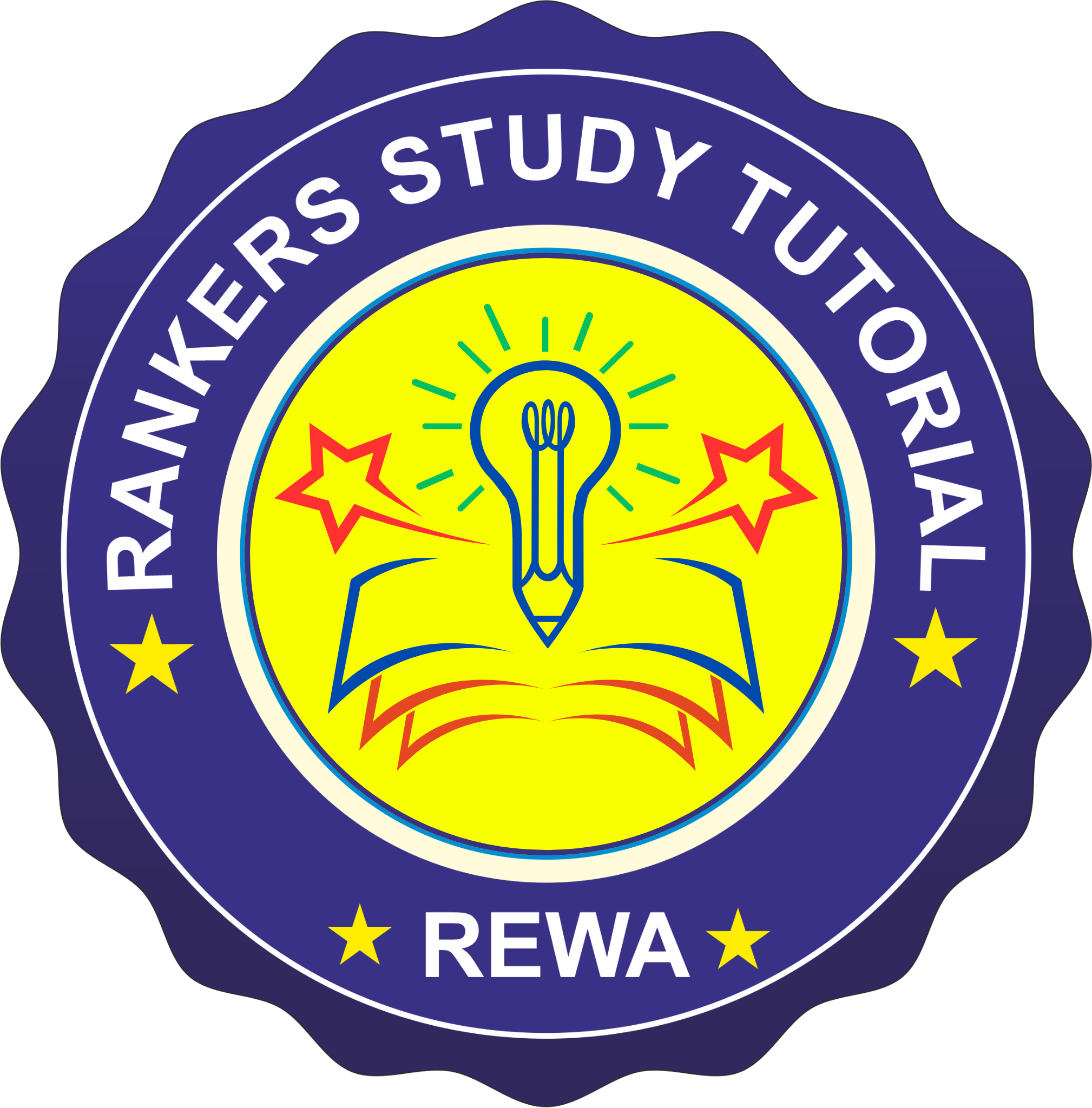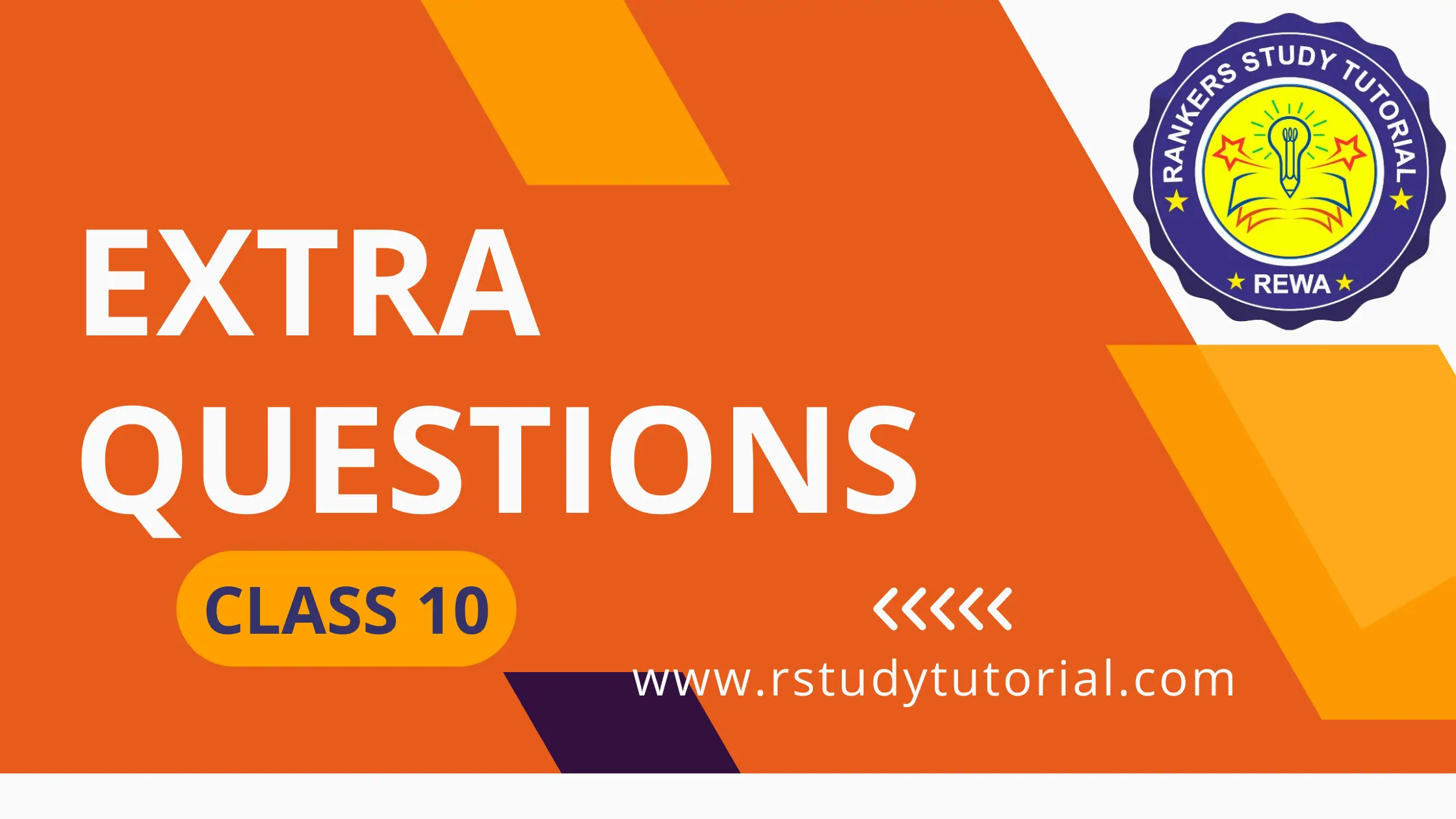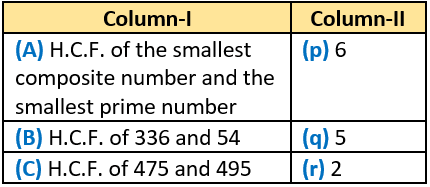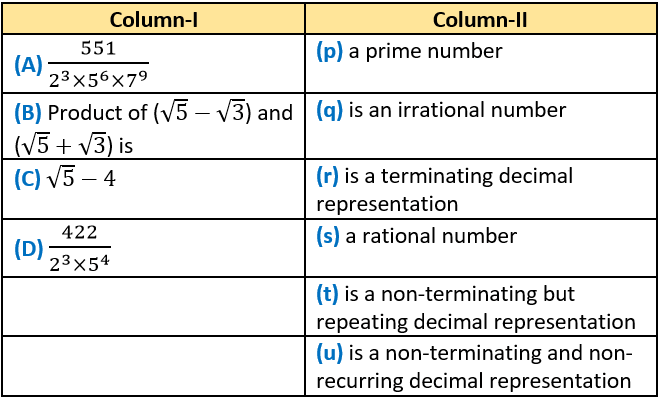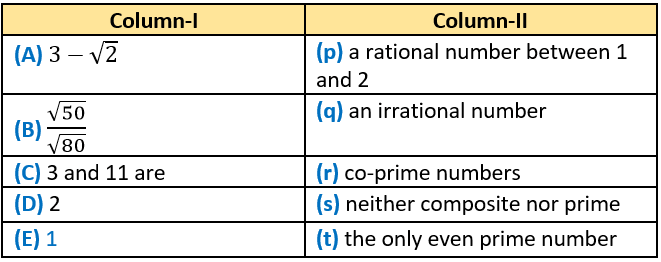Very Short Answers Maths Class 10 Chapter 1 Real Numbers
Fill in the blanks
Question.1. H.C.F. of 6, 72 and 120 is ________.
Question.2. 156 as a product of its prime factors __________.
Question.3. If a=bq+r, least value of r is ________.
Question.4. If every positive even integer is of the form 2q, then every positive odd integer is of the form __________, where q is some integer.
Question.5. The exponent of 2 in the prime factorisation of 144, is _________.
Ans.1. 6
Ans.2. 2^{2}\times 3 \times 13
Ans.3. Zero
Ans.4. 2q+1
Ans.5. 4
Question.6. \sqrt{2}, \sqrt{3}, \sqrt{7}, etc. are _______ numbers.
Question.7. 7\sqrt{5} is a/an ________ number.
Question.8. An algorithm which is used to find HCF of two positive numbers is __________.
Question.9. 6+\sqrt{2} is a/an __________ number.
Question.10. Every point on the number line corresponds to a _________ number.
Ans.6. Irrational
Ans.7. irrational
Ans.8. Euclid’s division algorithm
Ans.9. irrational
Ans.10. Real
Question.11. A _________ is a proven statement used for proving another statement.
Question.12. The product of three numbers is _________ to the product of their HCF and LCM.
Question.13. L.C.M. of 96 and 404 is __________.
Question.14. If p is a prime number and it divides a^{2} then it also divides _________, where a is a positive integer.
Question.15. \frac{35}{50} is a ________ decimal expansion.
Ans.11. lemma
Ans.12. Not equal
Ans.13. 9696
Ans.14. a
Ans.15. terminating
Question.16. An ________ is a series of well defined steps which gives a procedure for solving a type of problem.
Question.17. Every real number is either a _______ number or an __________ number.
Question.18. \frac{1}{\sqrt{2}} is a/an __________ number.
Question.19. Numbers having non-terminating, non-repeating decimal expansion are known as ________.
Question.20. \sqrt{5} is a/an _________ number.
Ans.16. algorithm
Ans.17. Rational, irrational
Ans.18. irrational
Ans.19. Irrational numbers
Ans.20. irrational
True / False
Question.1. Given positive integers a and b, there exist whole numbers q and r satisfying a=bq+r, 0≤r<b .
Question.2. HCF of two numbers is always a factor of their LCM.
Question.3. Every composite number can be expressed (factorised) as a product of primes, and this factorisation is unique, apart from the order in which the prime factors occur.
Question.4. Sum of two prime numbers is always a prime number.
Question.5. The number zero is irrational.
Ans.1. True
Ans.2. True
Ans.3. True
Ans.4. False
Ans.5. False
Question.6. \sqrt{2} and \sqrt{3} are irrationals numbers.
Question.7. π is an irrational number.
Question.8. Some irrational numbers are negative.
Question.9. If x=\frac{p}{q} be a rational number, such that the prime factorisation of q is not of the form 2^{n}5^{m}, where n, m are non-negative integers. Then x has a decimal expansion which is terminates.
Question.10. All real numbers are rational numbers.
Ans.6. True
Ans.7. True
Ans.8. True
Ans.9. False
Ans.10. False
Question.11. Any positive odd integer is of the form 6q+1, or 6q+3, or 6q+5, where q is some integer.
Question.12. Sum of two irrational numbers is an irrational number.
Question.13. The quotient of two integers is always a rational number.
Question.14. Two numbers can have 12 as their LCM and 350 as their HCF.
Question.15. 1/0 is not rational.
Ans.11. True
Ans.12. False
Ans.13. False
Ans.14. False
Ans.15. True
Question.16. The product of any three consecutive natural numbers is divisible by 6.
Question.17. If x=\frac{p}{q} be a rational number, such that the prime factorisation of q is of the form 2^{n}5^{m}, where n, m are non-negative integers. Then x has a decimal expansion which is terminates.
Question.18. All integers are real numbers.
Question.19. The number of irrational numbers between 15 and 18 is infinite.
Question.20. Every fraction is a rational number.
Ans.16. True
Ans.17. True
Ans.18. True
Ans.19. True
Ans.20. True
Match the Columns
Each question contains statements given in two columns which have to be matched. Statements (A, B, C, D) in column I have to be matched with statements (p, q, r, s) in column II.
Question.1.
Ans.1. (A)-r, (B)-s, (C)-p, (D)-q
Question.2.
Ans.2. (A)-r, (B)-p, (C)-q
Question.3.
Ans.3. (A)-(t, s), (B)-(p, s), (C)-(q, u), (D)-(r, s)
Question.4.
Ans.4. (A)-q, (B)-p, (C)-r, (D)-t, (E)-s
